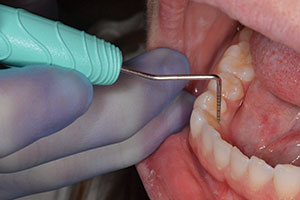As careers in dentistry evolve, hygienists will begin to reflect not only the practice demographic but the patient population as well. This article, written by a male hygienist who reflects back on the more than 16 years he has spent in a career that he loves, may serve as a beacon for others who have yet to choose their path. In addition, it offers insight into what brings a man into the career of hygiene and what makes him stay…respect for his patients and their health.
Hygiene has been a wonderful career for me to have chosen. It has been rewarding and fulfilling and has made incredible changes in direction and emphasis. Technology has added components not even considered many years ago. In response, I have had to make corresponding professional changes to remain current and to provide my patients with the best dentistry has to offer.
I started college in the spring semester and was taking some classes to get the feel of a full class schedule. I had no idea what I wanted to pursue as a career. When I was a month or so into the semester, I decided I needed some help and direction. I went to the allied health department, and the first department I walked into was dental hygiene. I started asking questions about the profession…What is a dental hygienist? How long is the program? What courses are needed to graduate? What is the demand for hygienists? And, very importantly, what is the starting salary? Everything the director told me sounded great. I became interested and began to think that maybe dental hygiene was the career for me. At that moment, I asked the director what was needed to start in the program. She advised me that she only needed to see my high school transcript, because she knew that it was my first semester in the college.
 |
|
Illustration by Nathan Zak |
I came in the next day with the information she had requested. She told me that because of my class standing in high school, I was able to start the program that fall. What she never told me was that my class had 54 women and only 5 men. I was not aware that the hygiene profession was like the nursing profession, mostly a female-type career at that time. I later discovered that the ease with which I entered the program came from the need to add more men to the program! It was very different for me having to deal with so many women, but it was fun, and we got along well.
In the beginning of the program I recognized that it was not going to be easy for me. In addition to the program requirements, other students had already fulfilled their science requirements, and I had to carry both the hygiene course load and finish chemistry and biology. When I was approaching the last semester, I began to realize that as a male hygienist, I might have difficulty finding a job. By the end of the program, due to course demands and the feeling that future placement might be a problem, we had just 2 men left in the class. We dug in and continued on toward the board exam and graduation.
ENTERING A NEW CAREER
Working in that environment was a great experience for me because I was able to see and treat many types of patients: poor, wealthy, healthy, and diseased. I learned how to function in different situations with different people while continuing to provide the care they needed. Working there for more than 2 years, I found myself loving more and more what I was doing, as well as what I was doing for the patients. I enjoyed watching the change in patients when they came to see me with bleeding, malodor, and inflamed gums, and the way the patients looked and felt after treatment. They noticed the difference! It was satisfying and continued to validate my career decision.
As I continued learning and developing professionally and personally through the years as a hygienist, I discovered that in this profession or any other profession, success does not depend on your gender or background. What I learned is that it is what you do with the skills you have in your hands and the love you put into it. Success is something you can control, given the right environment and support.
I continued to move on after working in the hospital, and it became a little easier to find hygiene positions. I had more experience. I was more confident in my abilities, and during the interview process I was able to interpret and indicate how I would achieve the goals that the office had set. I hope that as the years go by and our profession continues to develop, people’s mentalities will continue to evolve as well. (For example, male nurses are becoming more common.) With the right mindset, dentists won’t see being a male hygienist as a fault; rather, they will simply see a person who can provide the best care, regardless of gender. As more women become dentists, they may be more willing to accept male hygienists. The face of dentistry is changing.
SUCCEEDING AS A HYGIENIST
It has been 16 years since I graduated with that class of 2 men and 8 women (out of the original 54). I am now married with a family. I have been very successful in the practices in which I have worked because I’ve learned that when you place your heart into what you are doing, patients will trust you and accept your recommendations. If you believe in what you are doing and what you are recommending, the patient will see that through your eyes. It is not just offering and recommending treatment to patients, but it is also educating them to want treatment that makes you and your office successful. When I offer a specific product for home care, I am careful to explain why it will work and how it will help. For example, I will say, “I recommend you use this sensitivity toothpaste, because this will place a coating over the area where you have root exposure and will take away sensitivity.” Compare this to saying, “If you want, you may take home a sensitivity toothpaste that may help the area, or you can take it at your next visit.”
Patient care is no longer just in-office treatment. Home care has always been vital, but never more so than now. The emphasis on periodontal health and its links to cardiac health, diabetes, and other systemic diseases serves to change “care of the mouth” to “care of the body.” Patients improve when they are given the right information and attention they need. Some-times, it’s just listening to them and sensing their concerns. Sometimes we can make a difference and save a life!
When you begin to link patient needs and their care, it doesn’t matter what your gender is. You are offering your patient the treatment that is needed. Sometimes it’s a product. Sometimes it’s an ongoing schedule of treatment. Whatever the situation, you need to give your patients the highest standard of care. Speaking with confidence about your treatment and its benefits helps form the relationship needed for patient rapport. Building the practice relies on “obtaining and retaining” patients. Some-times, the fact that I have had to work longer and harder to be successful helps me build trust with my patients. They know I believe in what I say.
One of my beliefs is to treat my patients as if they were my family. (Sometimes they are!) Using words like “if you want…it may help…next time” take away from what you are presenting. I present only with positive words. It can be very important how you present what you are offering.
When I graduated, I said to myself that I will always give my patients the best service I can provide; I think all hygienists say the same thing at graduation. When we start working, however, we begin to see things so differently. We have production goals to meet. We have reluctant patients and team members who are not always helpful. Patients decide against treatment because their insurance doesn’t cover it or it is too expensive. It is difficult to tell patients you can help them become healthy, and then discover that they can’t afford treatment. It goes against what we were taught. One thing that helps me, though, is that I always want to keep my promise and give my patients the best I can offer them. I believe in the treatment I am giving the patient. When I am discouraged, I remember what Dr. Ross Lambert said in a recent lecture on periodontal disease when it comes to patients accepting care: “Some will, some won’t, and some wait.” My job is to do what’s needed to restore patient health or maintain the situation, and it is up to the patient to determine if he or she wants the service. I have been surprised many times with patients who reappear, having decided that what I said might help them after all.
As a male hygienist years ago, it was easy to start in hygiene school, and I was able to open doors for other male hygienists and introduce them to a wonderful career. I went through some struggles trying to find a job and make it happen, but there were many people who helped me overcome some difficult hurdles. I have learned, however, that nothing in life is easy, and you need to give it your all to make it happen. (My family is my reality check every day.) Success is based on what you believe and how strongly you want to accomplish something. In my case, I wanted the chance to prove to the practices where I worked that I was going to give my patients the best care possible. I have been very successful in the career I chose.
For all hygienists, male and female, the profession we chose can save lives, because as we know, periodontal disease is associated with heart disease and other life-threatening problems. We can screen for oral cancer, the seventh deadliest cancer in the world. We can check blood pressures and reassure anxious patients. We can soothe children and help senior citizens. It is our responsibility to discover the needs of patients and to treat and educate them so they can maintain their oral health. I believe that by giving your patients your best standard of care, you will be giving them a chance to be healthy and live a longer life. If you keep this in mind, you will reach your goals and be successful.
Going forward, patients will always respect you and believe in your treatment as a result of the way you put your mind and heart into what you do. This profession is growing and developing into something so much bigger than I thought when I started. As a hygienist, moreover as a male hygienist, I have made a difference. I have been successful and am proud of my training and patient care. I am thankful for those who have helped me grow and develop. If you want to be successful, just aim high and treat your patients with care. Dedication and the ability to persevere will stand the test of time.
I know…just check my reflection!
Mr. Rondon was born in New York City of Dominican descent and graduated from Hostos Community College in the Bronx in 1990 with an associate’s degree in applied science in dental hygiene. He is available to help others in the dental hygiene profession achieve their goals. He can be reached at rafaelangie@yahoo.com.











